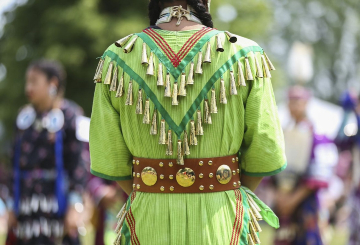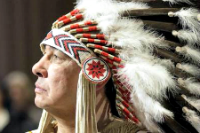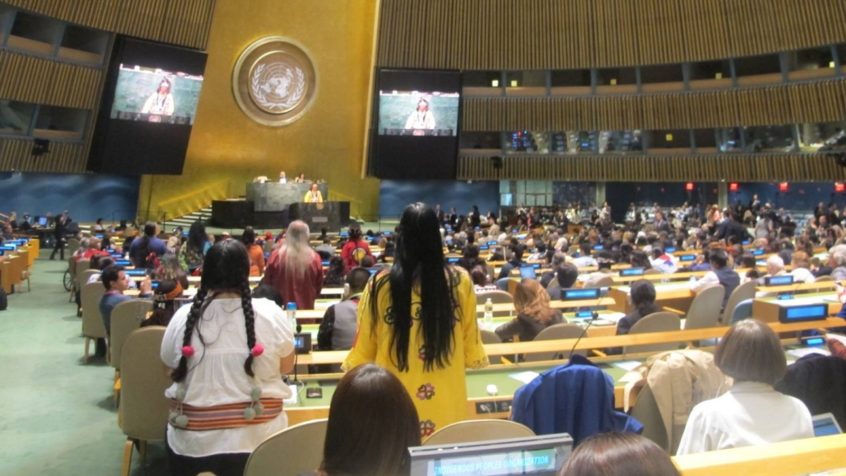Registration is now open!
Session 1: Tuesday, 9 March 2011 – click here to register
Session 2: Thursday, 11 March 2021 – click here to register
¡El regisro está abierto!
Sesión1: martes, 9 de marzo de 2021 – Haga clic aquí para registrarse
Sesión 2: jueves, 11 de marzo de 2021 – Haga clic aquí para registrarse
Background
In 2020, the Permanent Forum on Indigenous Issues postponed its 19th session due to the COVID-19 pandemic. The Economic and Social Council decided that the 20th session of the Permanent Forum will take place from 19-30 April 2021 on the theme of “Peace, justice and effective institutions: the role of indigenous peoples in the fulfilment of Sustainable Development Goal 16″.
In preparation for the 2021 session, the Permanent Forum will conduct informal virtual dialogues with indigenous peoples and Member State representatives. United Nations agencies, funds and programmes, regional and national human rights institutions, NGOs in consultative status with ECOSOC, and academia are also invited to participate. These virtual dialogues were instituted by Forum Members to continue the tradition of regional consultations that take place during the annual sessions of the Forum. The aim of the regional dialogues is to discuss issues of relevance in the countries of the region and identify how to sharpen the focus and impact of the Permanent Forum’s analysis and recommendations.
Geoffrey Roth, member of the Permanent Forum from North America, will lead the virtual dialogue. Geoffrey is a Standing Rock Sioux who has devoted his entire career to the advocacy of indigenous rights in diverse sectors. He currently provides advice on policy and legislative strategies for Urban Indian Organizations. Recently, he co-founded Inaji, an Indigenous-led technology company, providing culturally competent solutions to improve American Indian/Alaska Native (AI/AN) healthcare. In 2010, former President Barack Obama appointed him to serve in the U.S. Department of Health and Human Services (HHS) and the Indian Health Service (IHS). During this appointment, Geoffrey advised executive management of IHS, led the implementation of the Indian Health Care Improvement Act (IHCIA), and collaborated with HHS leadership on the implementation of the Affordable Care Act (ACA). Geoffrey has also served as the President of the National Native American AIDS Prevention Center and represented the USA in the International Indigenous Working Group on HIV/AIDS.
Antecedentes
En 2020, el Foro Permanente para las Cuestiones Indígenas pospuso su 19º periodo de sesiones debido a la pandemia de COVID-19. El Consejo Económico y Social decididó que el 20º periodo de sesiones del Foro Permanente se llevará a cabo del 19 al 30 de abril de 2021 sobre el tema: “Paz, justicia e instituciones fuertes: el role de los pueblos indígenas en el cumplimiento del Objetivos de Desarrollo Sostenible 16” .
En preparación para la sesión de 2021, el Foro Permanente lleva a cabo diálogos virtuales informales con los pueblos indígenas y representantes de los Estados Miembros. También se invita a participar a organismos, fondos y programas de las Naciones Unidas, instituciones regionales y nacionales de derechos humanos, ONG reconocidas como entidades consultivas ante el ECOSOC e instituciones académicas. Estos diálogos virtuales fueron instituidos por los miembros del Foro para continuar la tradición de las consultas regionales que tienen lugar durante las sesiones anuales del Foro. El objetivo de los diálogos regionales es discutir temas de relevancia en los países de la región e identificar cómo agudizar el enfoque y el impacto del análisis y recomendaciones del Foro Permanente.
Geoffrey Roth, miembro del Foro Permanente de América del Norte, liderará el diálogo virtual. Geoffrey es un Stand Rock Sioux que ha dedicado toda su carrera a la defensa de los derechos indígenas en diversos sectores. Actualmente brinda asesoramiento sobre políticas y estrategias legislativas para organizaciones indígenas urbanas. Recientemente, cofundó Inaji, una empresa de tecnología liderada por indígenas, que brinda soluciones culturalmente competentes para mejorar la atención médica de los indígenas estadounidenses / nativos de Alaska. En 2010, el ex presidente Barack Obama lo nombró para servir en el Departamento de Salud y Servicios Humanos (HHS) de EE. UU. Y en el Servicio de Salud para Indígenas (IHS). Durante este nombramiento, Geoffrey asesoró a la gerencia ejecutiva de IHS, dirigió la implementación de la Ley de Mejora de la Atención Médica Indígena y colaboró con los líderes del HHS en la implementación de la Ley de Atención Médica Asequible (ACA). Geoffrey también se ha desempeñado como presidente del Centro Nacional de Prevención del SIDA de los Nativos Americanos y representó a los Estados Unidos en el Grupo de Trabajo Internacional Indígena sobre el VIH/ SIDA.
Objectives
Provide a mechanism for a regional dialogue between indigenous peoples, Member States, and the United Nations system with the members of the Permanent Forum.
- Provide a mechanism for a regional dialogue between indigenous peoples, Member States, and the United Nations system with the members of the Permanent Forum regarding the human rights of indigenous peoples;
- Identify specific strategic measures to promote the implementation of the United Nations Declaration on the Rights of Indigenous Peoples, and ILO Convention No. 169 on indigenous and tribal peoples;
- Identify possible themes for a regional dialogue during the PFII 2021 session.
Objetivos
Proporcionar un mecanismo para un diálogo regional entre los pueblos indígenas, los Estados Miembros y el sistema de las Naciones Unidas con los miembros del Foro Permanente.
- Proporcionar un mecanismo de diálogo regional entre los pueblos indígenas, los Estados Miembros y el sistema de las Naciones Unidas con los miembros del Foro Permanente sobre los derechos humanos de los pueblos indígenas;
- Identificar medidas estratégicas específicas para promover la implementación de la Declaración de las Naciones Unidas sobre los Derechos de los Pueblos Indígenas y el Convenio núm. 169 de la OIT sobre pueblos indígenas y tribales;
- Identificar posibles temas para un diálogo regional durante la sesión del PFII 2021.
Sessions, Dates and Themes
The following four topics will be discussed over two days/four sessions.
Tuesday, 9 March 2021 – 2-4 PM (Eastern Standard Time)
COVID-19 and Indigenous Peoples
• Introductory comments by Anne Nuorgam, UNPFII Chair
• Remarks by H.E. Bob Rae, Permanent Representative of Canada to the United Nations
• Discussant: Rear Adm. Michael Toedt, Chief Medical Officer, Indian Health Service
Implementation of UNDRIP: Towards a full and meaningful participation of indigenous peoples at the United Nations
Discussants:
- Andrea Carmen, Executive Director, International Indian Treaty Council
- Kenneth Deer, Haudenosaunee External Relations Committee
Thursday, 11 March 2021 – 2-4 PM (Eastern Standard Time)
Missing and Murdered Indigenous Women and Girls
• Discussant: Gladys Radek, full-time volunteer advocate for the Missing and Murdered Women in Canada
United Nations International Decade of Indigenous Languages
• Discussant: Grand Chief Wilton Littlechild
Sesiones, Fechas y Temas
Los siguientes cuatro temas se discutirán durante dos días/cuatro sesiones.
Martes, 9 de Marzo de 2021, 2-4pm (EST)
COVID-19 y pueblos indígenas
Implementación de la Declaración sobre los Derechos de los Pueblos Indígenas: Hacia una participación plena y significativa de los pueblos indígenas en la ONU
Jueves, 11 de Marzo de 2021, 2-4pm (EST)
Desapariciones y asesinatos de mujeres y niñas indígenas
Decenio Internacional de Lenguas Indígenas
Outreach and Social Media
For all UN outreach and social media materials related to indigenous peoples, visit our Trello board here: http://bit.ly/1W8YMB5
- Facebook: https://www.facebook.com/unpfii/
- Twitter: https://twitter.com/UN4Indigenous
- Instagram: https://www.instagram.com/UN4Indigenous
Difusión y redes sociales
Para todos los materiales de divulgación y redes sociales de la ONU relacionados con los pueblos indígenas, visite nuestro tablero Trello aquí: http://bit.ly/1W8YMB5
- Facebook: https://www.facebook.com/unpfii/
- Twitter: https://twitter.com/UN4Indigenous
- Instagram: https://www.instagram.com/UN4Indigenous



